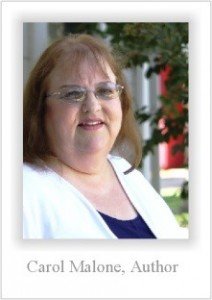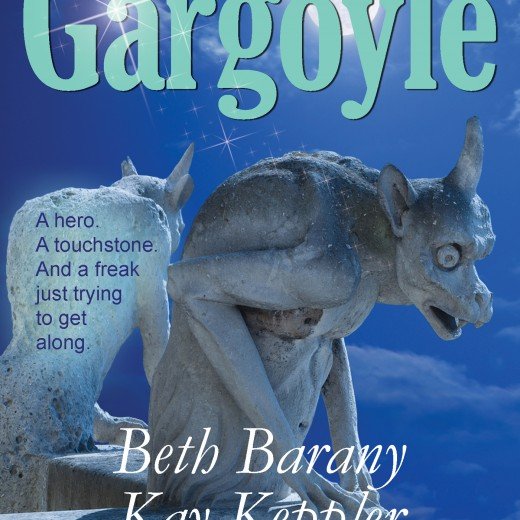“You Talkin’ To Me?” You Wanna Write Great Dialogue? By Carol Malone
This material first appeared as a course within the Group Coaching Program for Novelists where Carol is an assistant mentor. Click here http://coaching.bethbarany.com/ for more information about the program where we help novelists write, edit, publish, and market their books with joy, love, enthusiasm, and smarts.
***
Welcome back author Carol Malone as she gives us a quick look into what makes great dialogue and how to write it so our readers won’t run screaming into the night – of course, it would be a dark and stormy night. Enjoy!
***
 “Go ahead, make my day.” Great line, right? But what makes great great dialogue, memorable dialogue?
“Go ahead, make my day.” Great line, right? But what makes great great dialogue, memorable dialogue?
“Dialogue should be active, develops characters and create moods in the scene,” Karl Igelsias said, screenwriter, script doctor and consultant, “Dialogue is the first thing a publisher will look for.” In other words, don’t fill up your book with page after page of narrative. Give your reader highly charged dialogue and they will thank you for it.
In the following example, see if you can describe what these two young people are trying to converse about.
MARK: How do you distinguish yourself in a population of people who all got 1600 on their SAT’s?
ERICA: I didn’t know they take SAT’s in China.
MARK: They don’t. I wasn’t talking about China anymore, I was talking about me.
ERICA: You got 1600?
MARK: Yes. I could sing in an A Capella group, but I can’t sing.
ERICA: Does that mean you actually got nothing wrong?
MARK: I can row crew or invent a 25 dollar PC.
ERICA: Or you can get into a final club.
MARK: Or I can get into a final club.
ERICA: You know, from a woman’s perspective, sometimes not singing in an a Capella group is a good thing?
MARK: This is serious.
ERICA: On the other hand, I do like guys who row crew.
MARK: (beat) Well I can’t do that.
ERICA: I was kid–
MARK: Yes, it means I got nothing wrong on the test.
ERICA: Have you ever tried?
MARK: I’m trying right now.
ERICA: To row crew?
MARK: To get into a final club. To row crew? No. Are you, like—whatever—delusional?
ERICA: Maybe, but sometimes you say two things at once and I’m not sure which one I’m supposed to be aiming at.
MARK: But you’ve seen guys who row crew, right?
ERICA: No.
MARK: Okay, well they’re bigger than me. They’re world class athletes. And a second ago you said you like guys who row crew so I assumed you had met one.
ERICA: I guess I just meant I liked the idea of it. The way a girl likes cowboys.
MARK: (beat) Okay.
ERICA: Should we get something to eat?
MARK: Would you like to talk about something else?
ERICA: No, it’s just since the beginning of the conversation about finals club I think I may have missed a birthday.
What did you think of the relationship between this young man and woman? Is their conversation typical of young people? What do you think is are the chances their relationship will take off That excerpt was from the movie, The Social Network, between Mark Zuckerberg, the kid genius behind Facebook and a possible date.
What do you think makes dialogue highly charged or at odds, and how can it move the plot along?
I’d like you to consider what you could possibly do to make your novel’s dialogue something that stands out.
When I trained for a short time with a former editor at St. Martin’s press, she told me that then-President Thomas McCormack did something amazing when he’d hold group meetings with the editorial staff to find new books to publish. He would grab from the slush pile and open the manuscripts anywhere. If he found pages mostly empty of narrative and filled with lots of blank spaces – or large dialogue passages, he would tell the editors to offer the author a deal. It was that important for the reputation of St. Martin’s Press to publish books where the dialogue dominated the writing.
There are so many facets to learning good dialogue techniques; it would take days and days for me to discuss them all. So I’m going to rob from experts and offer some ideas that could stimulate your creativity. See if you could possible incorporate some of these items:
- The best advice I could possibly pass along is to become a student of dialogue. Maybe you could physically go to places where people meet, talk, laugh, and share. You could study the art of conversation by eavesdropping, listening to others speak. See Creative Writing Now http://www.creative-writing-now.com/how-to-write-dialogue.html
- Consider Resisting the Urge to Explain or RUE; [ex: “I hate you,” Gail said angrily.] Many consider this sort of sounding like an amateur. We are not amateurs.
- Kill your “ly” adverb darlings. Use instead a “beat” of action: [ex: “I can’t go,” Gail said sadly.] Say instead: [Gail dabbed at her eyes. “I can’t go.”]
- Stick to “said” as you dialogue tag and use after the character’s name. The tag disappears and it helps the reader keep track of who’s speaking. Self-Editing for Fiction Writers, 2nd Edition, Brown & King,
- Avoid boring, mundane, pedestrian dialogue. [“How you doing, Charlie?” Gail asked. – “Fine,” Charlie said. “You?” – “Oh, well, yeah, I’m okay,” Gail said. – “Doing anything special today?” Charlie asked. – “Nothing special,” Gail said. “You?”] YAWN!
- Add physical movements and/or beats of action. [ex: Marc ran his fingers through his hair, scuffed his feet. “I told you to stay out of it.”]
- Maybe you could try dialogue that’s secretive. Characters rarely reveal all their secrets, unless it’s the villain who’s about to murder the hero, then he can reveal all. This would require that you know your characters inside and out so you’ll know their secrets. Try interviewing your characters. Some playacting might just give you the insight into their speech and thought patterns.
- Don’t bloat your dialogue with exposition about a sunny plain in Spain. “Good writers leave out the boring part. They cut to the chase.” Elmore Leonard.
- Good dialogue could serve a purpose for your novel. “A good conversation is an escalation,” Nathan Bransford said. http://blog.nathanbransford.com/2010/09/seven-keys-to-writing-good-dialogue.html Maybe your character needs to communicate something, but not say it outright. Like I said, secrets could play a big part in dialogue.
- Great dialogue could reveal your character’s personality, their feelings and their thoughts. A boxer’s thoughts about becoming the champ are going to be different from a run-way model and her thoughts on not falling off the stage. What is the background of your characters? Whatever it is, they’ll bring they backgrounds to their conversations.
- Conflict is good. Tension is better. Cross purposes is the best. Just like the dialogue above from The Social Network, the conversation between Mark and his date felt like they weren’t on the same page. Did you notice that? We normally talk to others, but don’t say what’s on our minds or we speak in double talk. It works well in written dialogue. Go ahead; perhaps you could give it a try.
- Possibly mix your character’s speech patterns – create unique voice for each character. EX: Women usually talk in long sentences and a lot of them before taking a breath. Men use short, declarative sentences. Look at Number 8 on Writerly Community’s page http://writerlycommunity.azurewebsites.net/10-rules-writing-good-dialogue/
Consider the possibility that great dialogue can set the mood, reveal our characters, move the plot along, and shock the reader.
Remember one of the best lines if dialogue, not necessarily in a novel was this: “Louis, I think this is the beginning of a beautiful friendship.” We all know that Rick Blaine has just made the biggest sacrifice of his life. He’s let the girl go. We all feel bad for Rick. We wanted him to get the girl and live happily ever after. But he has sent Ilsa away with her husband to save the allies. We can’t feel too sorry for poor Rick, he does have Captain Louise Renault to offer him comfort. But that one piece of dialogue has remained a part of our lives since Rick – Humphrey Bogart uttered them.
I know you want to write sparkling, sizzling dialogue that will engage the reader, move the plot along, reveal secrets, keep secrets, give your characters voice, and make memorable dialogue that will remain with your reader long after they finish reading your book. If you could, choose a section of your manuscript that would be helped along if you were to incorporated highly charged or tension-filled dialogue instead of narrative and/or exposition.
***
ABOUT THE AUTHOR
 Carol Malone successfully combined her three passions – romance, sports, and writing in her highly rated book, Fight Card Romance: Ladies Night. With her love story “Ladies Night,” she became the first woman to punch her way into the male-dominated genre of pulp boxing. Her stories entice readers to scramble into a front row seat for a thrill-ride of romance and sports. When not hammering out new tales, Carol is reading, watching sports or the Food Network, or hanging with her sci-fi author husband.
Carol Malone successfully combined her three passions – romance, sports, and writing in her highly rated book, Fight Card Romance: Ladies Night. With her love story “Ladies Night,” she became the first woman to punch her way into the male-dominated genre of pulp boxing. Her stories entice readers to scramble into a front row seat for a thrill-ride of romance and sports. When not hammering out new tales, Carol is reading, watching sports or the Food Network, or hanging with her sci-fi author husband.
Website: http://carolmalone.net/
Facebook: https://www.facebook.com/carolmaloneauthor
Twitter: https://twitter.com/CarolAnneMalone






